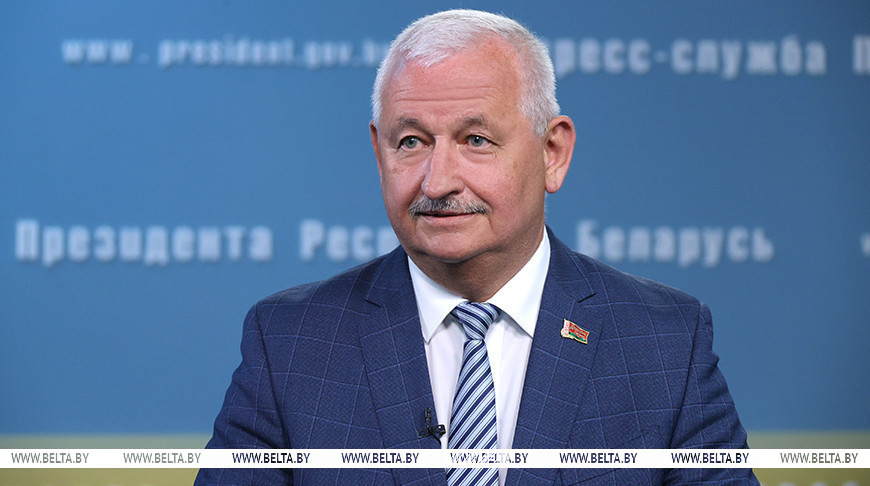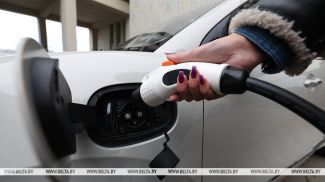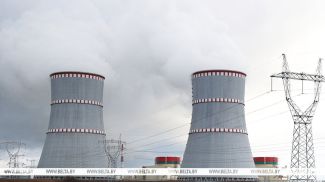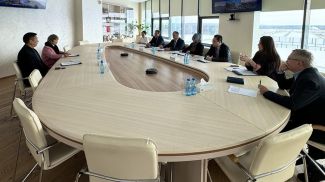
Piotr Parkhomchik
MINSK, 14 June (BelTA) – Belarus intends to hold negotiations with China to discuss the allocation of quotas for deliveries of Belarusian wood pellets. Deputy Prime Minister of Belarus Piotr Parkhomchik made the statement after Belarus President Aleksandr Lukashenko hosted a conference with top officials of the Council of Ministers on 14 June, BelTA has learned.
According to Piotr Parkhomchik, 67 facilities manufacture wood pellets in Belarus. As many as 60% of them belong to the state and are run by the Forestry Ministry and the Belarusian timber, woodworking, pulp and paper industry concern Bellesbumprom. As many as 40% have no departmental affiliation. Mass construction of these facilities has been prompted by two factors: the need to recycle waste wood as a byproduct of timber sawing and timber processing and by the high demand for wood pellets in the European Union. The capacity of the European market stands at 12.5 million tonnes per annum.
The facilities that have been built in Belarus allow making 1 million tonnes of pellets per annum. 2021 saw 570,000 tonnes of pellets sold to Europe. However, selling pellets on the European market became impossible as of H2 2022.
“The government has worked out comprehensive plans to use the pellets on the home market and work continues to find alternative options to sell these products to other countries,” the deputy prime minister said. In particular, the first batch of 2,000 tonnes of wood pellets has been sold to Uzbekistan. “We’ve agreed that after Uzbekistan tests our pellets, the country will become a permanent consumer of this product,” Piotr Parkhomchik said.
The Chinese market is of great interest for Belarus. “Although logistics is complicated, but if we organize it properly… Taking into account the fact that a large number of car assembly kits is shipped to our enterprises that make cars, these empty containers are shipped back to China. If we organize things right, we can get good logistics both for car manufacturers and for selling wood pellets to China,” Piotr Parkhomchik explained.
China’s restrictions on importing these products from Belarus and Russia represent an essential stumbling block for now. “We are working on coming to terms with the People’s Republic of China and securing quotas for shipping our pellets. The cellulose we make in Svetlogorsk is in great demand in China. During negotiations we will try to connect the two matters in order to secure results with regard to pellet shipments to the Chinese market,” the official said.
Speaking about higher sales on the domestic market, Piotr Parkhomchik noted that the task is still topical and being accomplished by the government. “The task the president set as a result of the conference is to step up efforts on the home market. We are talking about energy industry, public utilities, and domestic consumption,” the official said.
In his words, Belarus consumes 860,000 tonnes of firewood every year. The figure can be replaced with about 430,000 tonnes of pellets. “But to accomplish the task it is necessary to do very serious work to replace the equipment: the heating boilers. The government has signed the relevant resolution to authorize Belarusbank to subsidize the acquisition of boilers meant to produce heating energy by burning pellets,” Piotr Parkhomchik said. He said that it is necessary to do some serious awareness-raising in the regions in order to convince the population to switch from firewood to pellets.
BelTA reported earlier that the efficiency of wood pellet manufacturing facilities was one of the matters discussed during the government conference hosted by the president. The head of state criticized their current performance and sales volumes. The president believes the efforts to organize the export of this kind of fuel and use it on the home market are insufficient. Some civil servants do not work hard enough in order to increase the volume of sales because they count on natural gas deliveries instead. “After all, the president went and secured a deal… We will burn natural gas now. We don’t need firewood or wood pellets,” Aleksandr Lukashenko cited the reasoning of these civil servants.
Considerable investments including state investments and private ones have been poured into wood pellet manufacturing. However, Aleksandr Lukashenko noted, due to well-known external circumstances pellet manufacturing facilities are not doing really well while the stockpile of low-grade commercial wood is rising. “Meanwhile, the measures the government is taking have not produced results, frankly speaking,” the head of state stated.
The president pointed out: “Since the manufacturing facilities have been established, they need to work. And in the black. It goes without saying. And emerging problems should be addressed in a comprehensive and persistent manner.”













